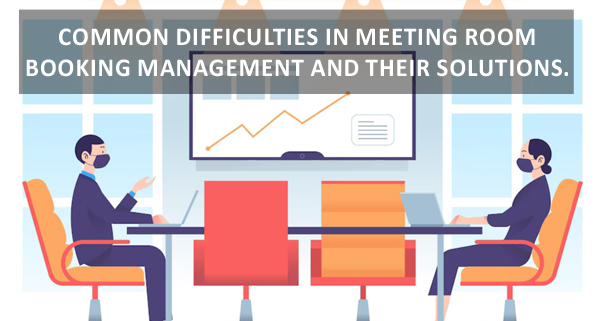Common difficulties in meeting room booking management and their solutions.
In the modern workplace, effective meeting room booking management has become a critical component of organizational efficiency. As companies grow and the nature of work evolves, the demand for collaborative spaces has surged. Meeting rooms are no longer just physical spaces; they are essential environments where ideas are exchanged, strategies are formulated, and decisions are made.
The challenge lies in managing these spaces effectively to ensure that they are utilized optimally, without conflicts or confusion. The complexity of meeting room booking management is amplified by various factors, including the number of rooms available, the diverse needs of teams, and the increasing reliance on technology for communication and collaboration. Organizations must navigate these challenges to create a seamless booking experience that accommodates the dynamic nature of modern work.
This article delves into the common difficulties faced in meeting room booking management and explores practical solutions that can enhance the efficiency and effectiveness of this crucial aspect of workplace operations.
Common Difficulties in Meeting Room Booking Management
Lack of Visibility and Transparency
One of the primary challenges in meeting room booking management is the lack of visibility into room availability. In many organizations, employees may not have real-time access to a centralized calendar or booking system, leading to double bookings or confusion about which rooms are free at any given time. This lack of transparency can result in frustration among team members, wasted time, and even missed opportunities for collaboration.
Diverse Meeting Requirements
Another significant difficulty is the diverse requirements for different types of meetings. Some meetings may require advanced technology, such as video conferencing capabilities or specialized equipment, while others may simply need a quiet space for discussion. Without a clear understanding of these varying needs, organizations may struggle to allocate rooms appropriately. This mismatch can lead to dissatisfaction among employees who find that their specific requirements are not being met, ultimately impacting productivity and morale.
Accommodating Hybrid Meetings
Furthermore, as remote work becomes more prevalent, accommodating hybrid meetings—where some participants are in-person while others join virtually—adds another layer of complexity to the booking process. When employees arrive at a meeting room only to find it occupied or unavailable, it disrupts their workflow and can lead to a negative perception of the organization’s operational efficiency.
Implementing a Centralized Booking System

One effective solution to address the challenges of meeting room booking management is the implementation of a centralized booking system. Such a system consolidates all meeting room information into a single platform, allowing employees to view real-time availability and book rooms with ease. By providing a unified interface for all users, organizations can significantly reduce the likelihood of double bookings and ensure that everyone has access to the same information regarding room availability.
Centralized booking systems often come equipped with features that enhance usability and functionality. For instance, many systems allow users to filter rooms based on specific criteria such as capacity, equipment availability, and location. This capability enables employees to find the most suitable space for their needs quickly.
Additionally, these systems can integrate with existing calendar applications, allowing users to book rooms directly from their calendars without needing to switch between multiple platforms. This seamless integration not only saves time but also enhances user satisfaction by simplifying the booking process.
Setting Clear Booking Policies and Procedures
Establishing clear booking policies and procedures is another vital step in improving meeting room booking management. Organizations should develop guidelines that outline how rooms can be reserved, including rules regarding cancellation, time limits for bookings, and priority access for certain teams or types of meetings. By setting these expectations upfront, organizations can minimize misunderstandings and conflicts over room usage.
Moreover, clear policies can help foster a culture of accountability among employees. When everyone understands the rules governing room bookings, they are more likely to adhere to them, reducing instances of no-shows or last-minute cancellations that can disrupt scheduling. For example, organizations might implement a policy that requires users to cancel bookings at least 24 hours in advance if they no longer need the space.
This approach not only frees up rooms for other teams but also encourages responsible usage of shared resources.
Utilizing Technology for Streamlined Booking Processes
The integration of technology into meeting room booking management can further streamline processes and enhance user experience. Various software solutions are available that offer advanced features such as mobile access, automated reminders, and analytics on room usage patterns. By leveraging these technologies, organizations can create a more efficient booking environment that meets the needs of their employees.
Mobile access is particularly important in today’s fast-paced work environment. Employees often need to make quick decisions about room bookings while on the go. A mobile-friendly booking system allows them to check availability and reserve spaces from their smartphones or tablets, ensuring that they can secure a meeting room whenever necessary.
Additionally, automated reminders can help reduce no-shows by sending notifications to users before their scheduled meetings, prompting them to confirm their attendance or cancel if their plans have changed. Analytics tools can also provide valuable insights into how meeting rooms are utilized within an organization. By tracking usage patterns, organizations can identify peak times for bookings and adjust their resources accordingly.
For instance, if certain rooms are consistently overbooked while others remain underutilized, adjustments can be made to optimize space allocation. This data-driven approach not only enhances operational efficiency but also informs future decisions regarding office layout and resource investment.
Conclusion and Recommendations for Effective Meeting Room Booking Management

Streamlining the Booking Process
Implementing a centralized booking system provides a foundation for transparency and ease of use, while clear policies establish expectations that promote accountability. This approach enables organizations to better manage their meeting spaces and ensure that all employees have access to the resources they need.
Embracing Technology for Enhanced Booking
Furthermore, embracing technology can significantly enhance the booking experience by offering mobile access and analytics capabilities that inform decision-making. Organizations should consider investing in comprehensive solutions that integrate these features to streamline their processes effectively.
Optimizing Meeting Space Utilization
By prioritizing these strategies, companies can ensure that their meeting spaces are utilized optimally, ultimately contributing to a more productive and collaborative work environment.
Key Considerations for Implementation
Ultimately, the key to successful meeting room booking management lies in finding a balance between technology, policy, and employee needs, and organizations that achieve this balance are likely to see significant improvements in collaboration and productivity.
One related article that provides solutions for common difficulties in meeting room booking management is the blog post on Havteq’s website titled “Cloud-Based Ticketing System.” This article discusses how implementing a cloud-based ticketing system can streamline the booking process, improve communication between team members, and reduce the risk of double bookings. By utilizing this innovative technology, organizations can effectively manage their meeting room bookings and ensure that all team members have access to the necessary information in real-time. To learn more about how a cloud-based ticketing system can improve meeting room booking management, check out the article here.
FAQs
What are some common difficulties in meeting room booking management?
Some common difficulties in meeting room booking management include double bookings, last-minute changes, lack of visibility into room availability, and difficulty in managing multiple locations or time zones.
What are some solutions to these difficulties?
Some solutions to these difficulties include implementing a centralized booking system, using calendar integration for real-time updates, setting up approval workflows for booking requests, and providing clear communication and guidelines for meeting room usage. Additionally, utilizing room scheduling software can help streamline the booking process and provide visibility into room availability.



